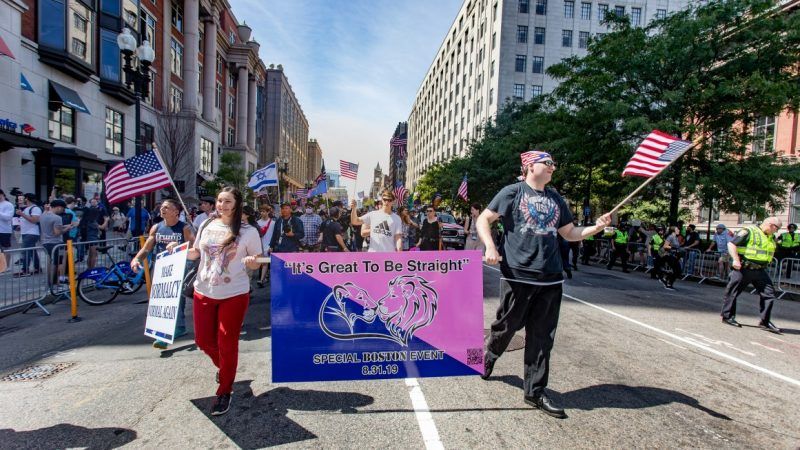Boston Judge Turns Stupid Straight Pride Parade Fighting Into Bizarre Constitutional Drama
An attempt by the district attorney to drop charges against nonviolent protesters was overruled.

The dumb drama around this past weekend's "Straight Pride" march in Boston has taken an increasingly bizarre turn, as a Boston judge has taken it upon himself to overrule both prosecutors and defenders who want to drop charges against some people arrested during the parade.
It's hard to decide where to begin when describing this roiling hornet's nest of culture-war madness. The story includes not just the typical performative conflict between alt-right marchers (complete with Milo Yiannopoulos on hand as parade grand marshal) and leftist counterprotesters, but also conflicts with police unions, reformist district attorneys who want to ease up on overly harsh penalties for nonviolent crimes, and the tough-on-crime types who want to stop them.
On Saturday, around 200 tiresome alt-right trolls put on a "Straight Pride" march in Boston. They were vastly outnumbered by counterprotesters—some of which were allegedly members of antifa—and things, unsurprisingly, got messy. A confrontation between cops and counterprotesters ensued, and some officers were recorded using pepper spray on some of the crowds:
https://twitter.com/lizzieheintz/status/1167918463995633664
Despite the "Straight Pride" monicker, the entire affair wound up having little if anything to do with LGBT issues. It was basically just another attempt to try to provoke reactions, complete with a giant pro-Trump float endorsing a border wall.
By the end of the day, 36 people had been arrested. (It's not clear from the information made public whether these were all counterprotesters or if the number also includes marchers or others on the scene.) Four officers sustained non-serious injuries.
Some of the arrests themselves seemed suspect, and the Boston Police Department says it will be examining officers' use of force during the protest. A clip from a local ABC affiliate, WCVB, appears to show a police officer tackling and arresting a man who was simply walking around, talking on a loudspeaker attached to his cell phone, and recording what was happening. The station says he was charged with assaulting a police officer.
Suffolk County's new district attorney, Rachael Rollins, was elected in 2018 as a reformer pledging to scale back on the prosecution of low-level offenses. During the campaign, she offered a list of crimes for which her office would likely decline to press charges. The list includes simple drug possession, minor driving offenses, disorderly conduct, and any charge of resisting arrest when a person is not charged with any other crimes to justify the arrest.
Many of the arrests were simply for disorderly conduct and were not of a violent nature. It's not unusual for a D.A.'s office to decline to prosecute these arrests, and Rollins went to court to ask Boston Municipal Judge Richard J. Sinnott to dismiss charges against seven of these nonviolent offenders (including the man mentioned above who had been arrested while simply talking to the crowd).
But Sinnott refused to dismiss the cases. He even imposed bail demands for the defendants, even though they had been charged with relatively minor crimes and bail was not requested. Sinnott then poured kerosene on the fire by ordering a defense attorney removed when she attempted to explain how, under Massachusetts case law, Sinnott was improperly interfering with prosecutors' discretion.
So now Rollins has filed an emergency petition (read it here) with the Massachusetts Supreme Judicial Court, seeking an intervention to stop Sinnott from forcing these cases to move forward against prosecutors' wishes. Wednesday night she called Sinnott's behavior an "unconstitutional abuse of power"; in her petition, she wrote, "Not only will the Commonwealth be forced to proceed on a criminal case it deemed inappropriate for prosecution…but the defendant will now suffer from a criminal record created as a result of the judge's unconstitutional decision to step out from behind the bench and step into the shoes of the prosecutor."
Meanwhile, the Boston Police Patrolman Union waded in to demand that the D.A. prosecute everybody they arrested. Union chief Michael Leary complained about protesters throwing rocks and unidentified liquids at them. Leary said, "You have people screaming at them all day long that they're fascists and that they're the bad guys. How would anybody like to have projectiles thrown at them all day?"
Leary said that before the judge acted. After Sinnott made his move, union spokesperson Larry Calderone praised the decision, saying the union "couldn't be happier with the judge that's on the bench."
While I don't want to ignore the palpable frustration police officers must feel when they're forced to play referee when two groups of people are itching to get physical, de-escalation is part of the job here. They, and Sinnott, need to get out the mindset that if they just bust a few more heads, these problems will all go away. That's not how it works. Indeed, some of these protesters will take it as a badge of honor that they've been the subject of state-sanctioned violence. And arresting random groups of people will just make it harder to focus on the protesters who actually did assault officers.
Rollins was elected by the citizens of Suffolk County, and reductions in unnecessary prosecutions were an explicit focus of her campaign. If Sinnott and the police union object to that approach, the appropriate thing for them to do would be to support an opponent next election.


Show Comments (246)